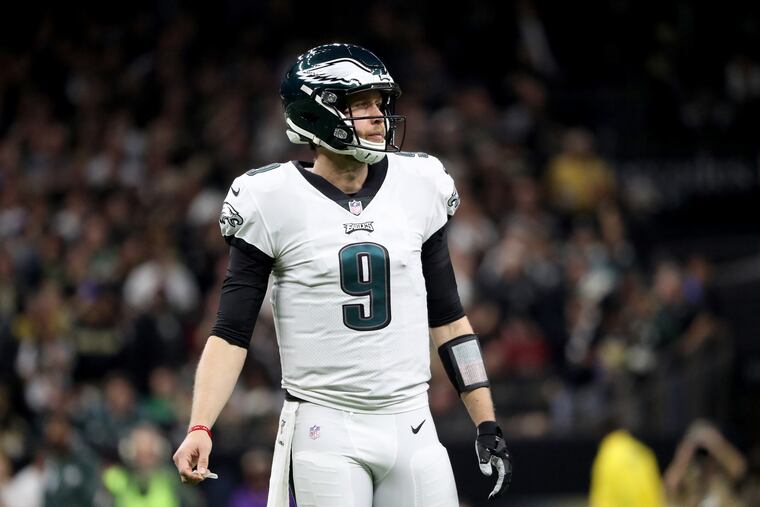Tag not it for Eagles and Nick Foles | Bob Ford
Tag-and-trade on the quarterback makes no sense for the Eagles when franchise tag season opens on Tuesday.

The two-week window allotted by the NFL for teams to place a franchise tag on their own free agents swings open on Tuesday and there has been rampant local speculation that the Eagles will do just that with quarterback Nick Foles — even though the move makes almost no sense at all.
Foles became a free agent by exercising a $2 million buyout of his 2019 salary, which is in keeping with his end-of-season quotes that, while he loves the Eagles, he wants to be a starter somewhere, and that won’t be here, at least until Carson Wentz’s next injury.
This puts the Eagles in a bit of a quandary, partly of their own making, but not an unexpected one. They didn’t need a backup quarterback making $20 million — which would have been his 2019 salary under the old contract — and they certainly don’t need one at $25 million, which is approximately what the one-year franchise tag would cost.
So, they either pat him on the back and let him walk away, or they tag him and trade him. The only problem with the latter option is that, technically, it’s against the rules. The franchise tag is meant to allow teams to lock up “franchise” players that they just don’t feel they can lose. The idea is not to use it as a way to secure a trade asset.
Foles could fight by refusing to sign the tag, and one supposes the NFL could enter into the mind-reading business of determining the Eagles’ intent ahead of time. But this is a league that can’t correctly figure out what a reception is after the fact. How will it get away with pronouncing what is on the mind of a team’s front office before something happens?
That alleged misuse of the tag conversation is interesting, but it is really beside the point. At the heart of the matter is what the Eagles might get in trade for Foles compared with the 2020 compensatory draft pick they would presumably get back if he walked and signed elsewhere as a free agent.
The assumption by those who study the thrilling subject of compensatory pick prediction is that Foles would bring back a pick tacked onto the end of next year’s third round. While that is educated guesswork, it is guesswork, nonetheless. The NFL’s exact formula for determining compensatory picks is a bit of a mystery, because the league won’t tell anybody what it is. That makes for a system that seems ripe for abuse, but as with many things, the NFL doesn’t really care what you think.
The compensatory pick is based on the salary, playing time and postseason success of the lost free agent, but it is also based on what the team that lost him does in the free-agent market. For instance, the Eagles are expected to receive three compensatory picks for the 2019 draft. In free agency, they lost five qualifying players (Trey Burton, Beau Allen, Patrick Robinson, LeGarrette Blount, and Caleb Sturgis) and signed two qualifying players (Haloti Ngata and Corey Nelson). Sturgis and Blount were canceled out by Ngata and Nelson, leaving the Eagles at a minus-3 for free agents. By the formula that has been divined from past tea leaves (overthecap.com is the champ at this), the Eagles will get a fourth-round compensatory pick and two sixth-round picks.
In other words, there is no way to project what losing Foles will bring in the 2020 draft without also knowing what other qualifying free agents are lost, and what qualifying free agents are brought in. If you want to try to predict that, have at it.
Let’s say the projections are correct, however, and it is a third-round pick that comes back to them. How much better could they do on the open market … for a guy who is guaranteed $25 million this coming season, and can leave after that? Joe Flacco just got traded to Denver for a fourth-round pick. He has three years left on his contract, but zero of it is guaranteed.
» READ MORE: The X’s and O’s behind Carson Wentz’s ‘healthy’ involvement in the Eagles offense
We can debate the relative merits of Foles and Flacco — boy, that would be exciting — but the market is the market, and there aren’t that many buyers. Sure, the argument could be made that the Eagles can keep Foles out of their division, but the quarterback could also balk at a trade he didn’t like by indicating he won’t sign long-term with the team that deals for him. How would it be in his best interest to join a team that had to weaken its assets just to get him?
When you add up the rewards and risks, the tag-and-trade gambit is far-fetched. Another very real reason is that the Eagles would put themselves about $20 million over the 2019 salary cap if they used the franchise tag on Foles, and they have to get under it before the trading period reopens on March 13. To do that would require a roster restructuring of massive proportion. A bunch of guys would have to be released, and none of them would meet the qualifications for additional compensatory picks.
It’s nice to think that Howie Roseman has a brilliant strategy up his sleeve to shake loose a big return for Foles, but that’s just not going to be the case. They played this to get back the $2 million buyout and get Foles off the books — also anticipating the 2020 compensatory pick — and that’s going to be it. The window does open on Tuesday, but it makes no sense for the Eagles to climb through.